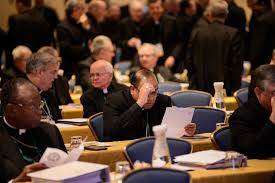
Vatican tells bishops not to vote on policy reforms that would impose heightened compliance and accountability standards on the Catholic hierarchy.
Article Title
Vatican tells U.S. bishops not to vote on proposals to tackle sexual abuse, spurns outside investigations
Link to Article: https://www.washingtonpost.com/religion/2018/11/12/vatican-asks-us-bishops-not-vote-sexual-abuse-proposals-they-planned/?utm_term=.60cae7d53552
Source: Washington Post
Author(s): Julie Zauzmer and Michelle Boorstein
Date: November 12, 2018
Synopsis of Article
The leadership and membership of the US Conference of Catholic Bishops (USCCB) came to Baltimore for their Fall 2018 meeting poised to vote on measures intended to address the spiritual and legal cancer of child sexual abuse and concealment that has metastasized across the world-wide Roman Catholic Church. The Vatican, however, intervened at the eleventh hour and demanded that the US bishops not vote on the proposals before them.
The proposed measures included a code of conduct for bishops (sorely needed as a response to the scandalous rise and precipitous fall of the child-molesting ex-Cardinal Theodore McCarrick) and creation of a lay-led commission vested with the power to investigate misconduct by bishops (and cardinals, all of whom are also bishops).
The President of the USCCB, Daniel DiNardo (a.k.a. Daniel Cardinal DiNardo) said that the Vatican insisted the vote be deferred until after a summit meeting in Rome late in February 2019, at which the heads of national bishops conferences from around the world are supposed to thrash out the “universal” church’s response to the clerical child sexual abuse crisis. There has been much speculation as to why the Vatican blocked the vote. One distinct possibility is Vatican concern regarding legal issues surrounding mandatory reporting of child sexual abuse allegations to civil authorities and the Vatican’s insistence on the primacy of Cannon Law over Civil Law for clerics charged with abuse.
Archbishop Christophe Pierre, the Vatican’s ambassador to the US (a.k.a. the papal nuncio), telegraphed the Vatican concerns when he addressed the Conference and helpfully warned the bishops not to trust investigations by external (law enforcement) agencies. According to the article, Pierre said:
“There may be a temptation on the part of some to relinquish responsibility for reform to others from ourselves, as if we were no longer capable of reforming or trusting ourselves. Assistance is both welcome and necessary, and surely collaboration with the laity is essential. However, the responsibility as bishops of this Catholic Church is ours.”